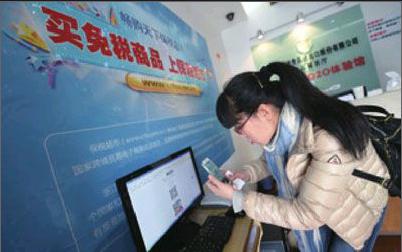Picking Up the Slack
2015-05-22ByDengYaqing
By+Deng+Yaqing

Lin Meijuan, a young mother who used to entrust overseas purchasing agencies to buy formula milk powder, cant mask her anger when recalling her unpleasant experience of being cheated by a self-assumed Chinese Australian.
“I bought six cans of milk powder from an online retailer. After waiting for nearly a month, I finally got my hands on them,” Lin said.
Feeding her baby with the milk powder she bought online for a few days, Lin found they caused diarrhea. “After comparing it with baby formula by the same brand my friend bought from Hong Kong, I realized my purchases were counterfeit products,” she said.
Customers with grievances like Lins may soon breathe a sigh of relief. The State Council, Chinas cabinet, recently approved the setup of the countrys first state-level cross-border e-commerce pilot zone in Hangzhou, capital of east Chinas Zhejiang Province. According to the operational plan of the pilot zone, overseas commodities can be stored in bonded warehouses and delivered to Chinese consumers immediately after they place orders.
Therefore, imported baby formula delivered from the pilot zone should have undergone inspection in batches by a quality watchdog and had their quality and safety guaranteed in line with national standards, said Zou Yongming, President of Shanghai Holyca E-business Co. Ltd.
Zou noted that related tax exemption policies, bulk transportation and shorter distances will allow Chinese consumers to pay less and receive the goods earlier than they do if entrusting overseas purchasing agencies or directly asking overseas e-commerce websites to send the goods.
Since most overseas e-commerce websites dont provide direct mail services, Chinese consumers online purchases of items such as milk powder have to be delivered by transfer companies. In the process, commodities may be damaged, lost or swapped out. Given the uncertainties of international logistics, customs clearance and taxation, delivery time can be indefinite.
“It usually takes at least half a month for end-buyers in China to receive the goods they order abroad through purchasing agencies or on e-commerce sites. In comparison, the time can be squeezed to two or three days if crossborder e-commerce platforms are available,”said Huang Side, General Manager of Bermasde International Trade Chongqing Co. Ltd. “Besides that, its more economical. Consumers only need to pay 1,200 yuan ($193) to buy a Philips shaver on a cross-border e-commerce platform, which may cost 1,800 yuan ($290) in physical stores in China.”
Pilot program
Since 2013, the Chinese Government has allowed seven cities—Shanghai, Chongqing, Hangzhou, Ningbo in Zhejiang, Zhengzhou in Henan Province, as well as Guangzhou and Shenzhen in Guangdong Province—to pilot cross-border e-commerce import services.
In March, Premier Li Keqiang pledged that the government will release more favorable import policies and expand comprehensive trials in cross-border e-commerce. The birth of the cross-border e-commerce pilot zone in Hangzhou shows that the emerging industry has received more attention and support.
“After three to five years of efforts, the pilot zone in Hangzhou will grow into an e-commerce center known for entrepreneurship and innovation, quality services and data technology. It will be characterized by the combination of e-commerce, cross-border trade and comprehensive services,” said Zhang Hongming, Mayor of Hangzhou.
Yang Guoxun, Deputy Director of the Advisory Committee for State Informatization, insisted that the development of cross-border e-commerce will not only help reshape international industrial chains but also facilitate the transformation of Chinas foreign trade growth pattern.
“The pilot zone in Hangzhou, if successful, can be replicated and promoted in other areas of the nation,” Yang said.
According to statistics from China E-Business Research Center, the value of Chinas imports and exports surpassed $4 trillion in 2013, of which the volume of crossborder e-commerce transactions amounted to 3.1 trillion yuan ($499 billion), up 31.3 percent year on year. Moreover, a global trade report released by the Ministry of Commerce has predicted that the industry will keep expanding at an average annual pace of more than 30 percent.
Not that simple
In most cases, online shoppers like Lin dont buy in bulk, and the categories of commodities in one order may encompass a variety of items.
As for cross-border e-commerce platforms, the processing of an order containing several imported commodities, customs clearance in particular, can be complicated and timeconsuming, not to mention there are many single items wrapped in packaging that need to be unwrapped when going through inspection procedures.
Moreover, a sound business and supervision model regarding payment, tax reimbursement and settlement of exchanges has not yet come into existence, explained Han Feng, a senior executive of Xian Haitaotong E-Business Co. Ltd. in Xian, capital of northwest Chinas Shaanxi Province.
“As far as cross-border e-business companies are concerned, they are expecting a set of strict operation procedures that standardize every aspect of transactions,” Han commented.“Only in this way can the goods be prepared, delivered and cleared by the customs in accor- dance with requirements. With a complete set of operation procedures in place, companies will be relieved from many concerns and focus on expanding their business.”
The State Council has suggested that the pilot zone in Hangzhou devise technical standards and establish operation procedures and a supervision model covering payment, logistics, customs clearance, tax refunds and foreign exchange settlements.
“In a broad sense, cross-border e-commerce transactions are classified into business to business (B2B) and business to customer(B2C) categories. Now, B2C is more popular,”said Lei Ming, Marketing Director of Shanghai Hank Business Consulting Co. Ltd.
Zhang Hong, head of the School of Economics and Management of Xian University of Posts and Telecommunications in Shaanxi, believes B2C will take up more market shares.
“Given advanced Internet technologies and the vogue of personalized consumption, the trend of trade fragmentization has become increasingly conspicuous,” Zhang said.
Supervision and support
Since cross-border e-commerce transactions are usually real-time and sporadic, the traditional supervision system doesnt work, said Yang, who calls for a brand new supervision and supporting system to be launched.
In August 2014, the General Administration of Customs promulgated its No.56 Decree, which makes clear matters on the supervision of cargo entry and exit in cross-border ecommerce transactions. “Now, most links of the industry need to be standardized by policies, including tax collection, customs clearance and declaration,” said Wang Xiaoxing, an analyst from Analysys International , a leading Chinese Internet consulting company.
In addition, Zhang Xiangli, an analyst with iResearch, a Beijing-based market research and consulting company, noted that most existing e-commerce policies are geared toward regulating business activities and companies in the trade, while enterprises that provide supporting services for them, such as logistics integration, are neglected.
“To smooth the development and standardization of the cross-border e-commerce, authorities should unveil more favorable policies targeted at supporting services providers,”he said.
